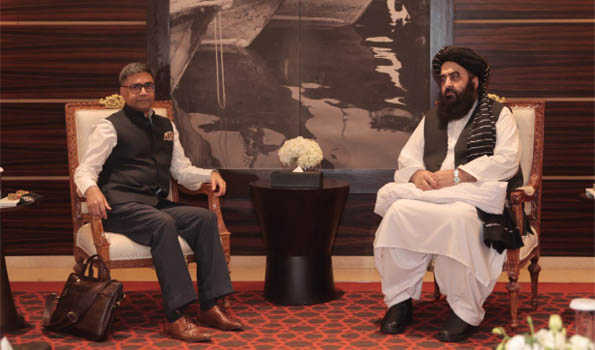India has no alternative but to engage with the Taliban
Undoubtedly, the fissures between Pakistan and Afghanistan make the case for greater Indian engagement with the Taliban but it would be shortsighted to attribute such engagement as being solely contongent on Pak-Afghan relations. Regional security, trade and real politik demand that India engages with the Taliban. And India has quietly been doing that for awhile now.

In politics, it is said, there are no permanent friends or permanent foes, only permanent interest. This is perhaps how india’s engagement with the Taliban can be explained. The recent meeting of Foreign Secretary Vikram Misri with the acting Taliban foreign minister Amir Khan Muttaqi has caused quite a stir, not just in India but internationally too.
At the meeting India agreed to not just continue but step up humanitarian aid to Afghanistan and “would consider engaging in development projects in the near future,”, while also promoting the use of Iranian port of Chabahar for trade, commercial activities and humanitarian assistance. On its part the Taliban issued a statement which said that it sought to strengthen political and economic relations with India, “a key regional and economic player.”
Misri’s meeting is the most high level meeting that has taken place with the Taliban. Till now, the most senior person to meet with the group ‘s officials has been Joint Secretary J P Singh. Interestingly, Misri’s meeting with Muttaqi came against the backdrop of an escalating Pakistan-Afghanistan conflict.
On December 24, the Pakistan Air Force carried out strikes on the Tehreek-e-Taliban Pakistan (TTP) in the bordering Afghan province of Paktika. While Pakistan claimed that TTP terrorists had been eliminated, the Afghan Taliban claimed that the strikes killed 46 civilians, mostly women and children. On December 28, the Taliban claimed to carry out retaliatory strikes against Pakistan.
In an unprecedented move, on January 6 India’s Ministry of External Affairs released a statement saying “We unequivocally condemn any attack on innocent civilians,”, and that “It is an old practice of Pakistan to blame its neighbours for its own internal failures. We have also noted the response of an Afghan spokesperson in this regard”.
Undoubtedly, the fissures between Pakistan and Afghanistan make the case for greater Indian engagement with the Taliban but it would be shortsighted to attribute such engagement as being solely contongent on Pak-Afghan relations. Regional security, trade and real politik demand that India engages with the Taliban. And India has quietly been doing that for awhile now.
India’s centuries long civilizational ties with Afghanistan were interrupted by the first Taliban rule in the late 1990s. Having hitched its policy regarding Afghanistan to US-led policies there India remained a strong supporter of the successive US-backed governments there. Even when it became imminent that the Taliban would be back in power in Kabul, New Delhi held back from engaging with the group. All other regional powers, including india’s close strategic partnership Russia, as well as China, Iran, and Afghanistan ‘s immediate neighbours Uzbekistan and Turkmenistan had opened channels of communication with the Taliban, coordinating local and border security and trade while India held back. As a result, India had to evacuateits personnel, close down its many consulates in Afghanistan, and finally shut down its embassy in Kabul as the Taliban swept to power there in August 2021.
India has now come around to the understanding that Afghanistan ‘s other neighbours and regional powers have: the Taliban are here to stay, brutal as it’s rule might be, it was for Afghan people to deal with that. On the other hand, the Taliban remained the most promising foil and bulwark against the ISIS – Khorasan Province whose footprint was increasing in the region with brutal attacks in Iran, Russia, and attempted ones on countries like India, Takjikistan, and Uzbekistan. The decimation of the group in Iraq has heightened the danger in Central and South Asia as the residual recruits have flocked to Afghanistan.
If the Taliban could effectively deal with the ISIS and sundry other terror groups on its territory then it would not only ensure security for the region but also security for business and trade opportunities that Afghanistan opens up. Engaging with the Taliban would be a trade-off for security for these states.
While there has not been any formal recognition of the Taliban government so far countries like Kazakhstan and Uzbekistan have already removed the group from their list of proscribed and terrorist organizations. Last month Russian lawmakers passed a bill that would give courts the power to remove groups from the country’s list of terrorist organizations, facilitat8ng 5he Taliban’s removal from such a list. All these countries have allowed the Islamic Emirates of Afghanistan (IEA), the official Taliban nomenclature for Afghanistan to take charge of the diplomatic missions in their countries. China has gone a step ahead and even stationed its Ambassador in Kabul inking deals in Afghanistan ‘s lucrative metals and mining sector.
It is therefore only a matter of course for India to follow suit, especially since it has invested and continues to invest in Afghanistan ‘s development and capacity building. From dams to parliament to historical monuments, India has been actively involved in building Afghan infrastructure and society. India has continued to dispatch humanitarian aid to Afghanistan even after the Taliban takeover.
In 2022 India reopened its embassy in Kabul, with a “technical team” operating there. Quietly, a couple of Taliban officials have also taken up residence in the Afghan diplomatic complex, in Delhi as well as in Afghan consulates in Hyderabad and Mumbai. .
The Taliban, in turn, has also been making overtures to India, and has on number of occasions stated that it would not allow its territory to be used against India.
This makes it only logical for India to follow the regional consensus. Afghan-Pakistan tensions only reinforce that India’s decision serves its own security interests.